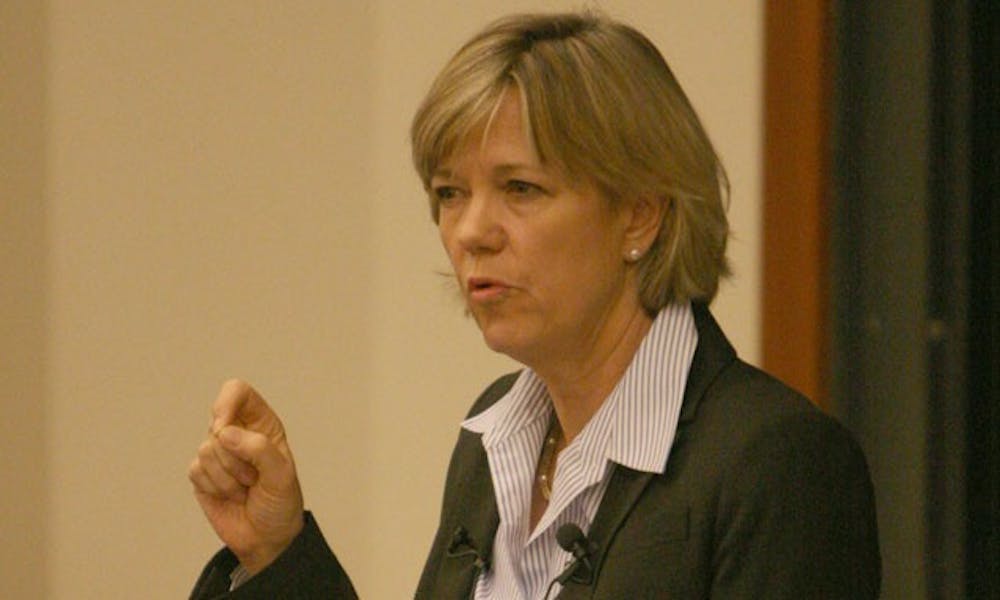For Dana Priest, stumbling upon a secret prison in Afghanistan makes investigative journalism an attractive profession.
Priest delivered this year’s James D. Ewing Lecture on Ethics in Journalism to an audience of more than 50 people Monday night at the Sanford School of Public Policy. In her speech, Priest described her adventures in government accountability and investigative reporting, focusing on the stories which collectively earned her two Pulitzer Prizes.
Leading the audience into the world of investigative reporting—what she referred to as “the story behind the story”—Priest began with her experience uncovering the existence of Central Intelligence Agency secret prisons.
As Priest wrote in The Washington Post in 2005, the CIA used these prisons after the Sept. 11 attacks with the authority of former President George W. Bush’s administration to interrogate terrorism suspects outside the limits of military protocols and the Geneva Conventions. Known as “black site” prisons, these facilities were located in countries in Eastern Europe, Thailand and Afghanistan, where Priest inadvertently discovered the first of such sites.
Priest recounted the interrogation tactics a CIA official had told her the agency used on terrorism suspects.
“They would black out [the suspect’s] whole world,” Priest said. “They would keep the detention cell black. They would put gloves on their hands, earphones over their heads and shields over their eyes...and of course we know about the waterboarding.”
Priest also discussed reporting the Walter Reed scandal in 2007, a story that involved exposing the subpar conditions and management at Walter Reed Army Medical Center, which provides health care to soldiers and their families.
Priest said one of the hospital’s buildings, Building 18, “had mold and was roach and mice-infected.” When she first learned of the building’s condition, Priest said she insisted on photographing its deteriorating state to portray all the other administrative and bureaucratic decay throughout the hospital.
With respect to ethics, Priest addressed the inherent conflict between obtaining classified information from government officials—thereby jeopardizing their jobs—and a reporter’s duty to seek out and reveal the truth. In 2006, one of Priest’s alleged sources was fired from the CIA for leaking information regarding the secret prisons.
But Priest said this instance did not alter her views on publishing classified information.
“You certainly wouldn’t want to stop what you’re doing as a reporter [just] because someone might decide to go after the people who might be helping you,” she said.
Jay Hamilton, director of the DeWitt Wallace Center and Charles S. Sydnor professor of public policy and economics, reiterated Priest’s experience in reporting sensitive national security issues.
“She fits the profile of having to deal with ethical questions on a daily basis,” he said.
In addition to illustrating her experiences as an investigative reporter and opinions on the ethical gray areas, Priest gave general advice to those aspiring to pursue journalism. Contrary to what television journalism personalities suggest, a good journalist learns to listen, not talk, she said.
“Listen to what [your sources are] saying. Listen to what they’re not saying. Listen to their body language,” she added.
Philip Bennett, Eugene C. Patterson professor of the practice of journalism and public policy, introduced Priest as a former co-worker and “one of the most courageous investigative reporters” he has worked with. During his time as managing editor of the Washing Post from 2005 to 2009, Bennett worked alongside Priest as she exposed both of the major scandals she discussed.
Bennett also said he hopes journalism students who attended the lecture had come to appreciate the complexity of the ethics-related questions Priest addressed.
“It’s very easy to reduce them to right or wrong or up or down—but they’re very complex,” he said, “And it’s a fluid part of what our democracy is dealing with, especially in a time of war.”
Although Priest noted that investigative reporting is “the biggest challenge for anybody” in journalism, she said the rewards of the job outweigh its negative aspects.
“I’m at the place where I’ve always wanted to be,” she said.
Get The Chronicle straight to your inbox
Signup for our weekly newsletter. Cancel at any time.

